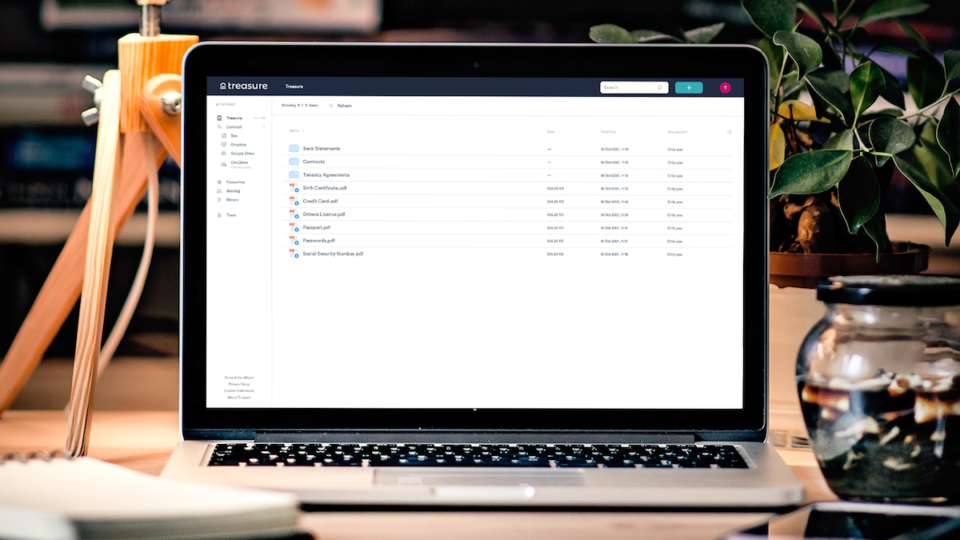How secure is your data? I mean, do you even think about it? We lock our doors the moment we get home, we keep our pin numbers secret, and we don’t discuss the spoilers of TV shows with people who haven’t seen them yet. Security is a big part of our lives, but people tend to overlook data security even though it could have potentially huge ramifications on our lives.
Our attitude to data security tends to be about trusting tech companies to be moral and respect our data privacy. Let us be the first to disappoint you—Whatsapp was recently fined €225m by the EU for sharing user information with companies under Facebook.
While they’ve since promised end-to-end encryption for user messages, it’s a signal to us that we should start paying more attention to our data, and specifically what is being stored on the cloud under our names.
Companies like Treasure Cloud promise user privacy upfront, as opposed to services like Google Drive and OneDrive that often scan the data you upload and use that information for their own purposes—kinda creepy, right?
Treasure Cloud encrypts all your data, preventing even themselves from viewing it—all while being cross-functional with popular services like Google Drive and Dropbox. Any data transferred from your existing accounts to your Treasure Cloud server becomes encrypted as well.
How bad is cyber security right now?
Things may have just gotten worse because of the pandemic. Amidst the fears for our physical health, cyber risks have climbed to an all time high as we said goodbye to our offices and worked increasingly online, and experts have been raising alarms.
Verizon’s 2021 report on Data Breaches specified over 5,000 incidents in Asia Pacific alone, 96% of which were focused on stealing credentials. Unlike Jim and Dwight’s infamous argument in The Office, identity theft is hardly a joke.
Asia Pacific, which includes us, has jumped to the second most at-risk region behind North America. Who’s at risk? Just about everyone, it seems. The data showed breaches across all the main sectors, like Finance, Healthcare, Retail, Manufacturing, Education, just about anywhere where people store valuable financial or personal information.
Singapore, renowned for its peace and safety, isn’t spared the risk as well. Data leaks on our shores have been increasing.
Take the public sector, for example. You can’t live here without dealing with the public sector in some form or other—be it paying taxes or applying for a license—and your data is stored within their servers.
The Straits Times reported that there were 108 cases of data leaks in the public sector in 2020, a 44 percent on-year increase. The authorities claim that the incidents were of “medium” or “low” severity, but it seems prudent to aim for as few breaches as possible.
The worst of 2021
Alarm bells began ringing here back in 2018, set off by the breach of the Ministry of Health’s HIV registry—exposing the confidential data of over 14,200 patients. That same year, a vulnerability in the State Court’s online system was breached, and 223 case files were accessed illegally.
The similarities between this and the opening act of a Hollywood summer blockbuster stop here—as the public sector has spent S$1b since on measures to protect citizen’s personal data. Worryingly, as mentioned above, however, breaches are still happening.
A Sophos study of 900 businesses across Asia, including Singapore, India, Japan, and Malaysia, reported that 68% had been successfully breached in 2021. About half had suffered serious data loss.
Some Singaporean businesses were dealing with at least 50 attempted security attacks or mistakes a week, on par with Manchester United’s miserable form. A third were successfully breached, and suffered serious data loss.
In logistics, air transport IT company SITA suffered a serious breach earlier this year. The result? Data belonging to 580,000 Singapore Airlines Krisflyer and PPS members were compromised—though the carrier clarified that no crucial data such as passwords or credit information were stolen. The “What If” question surrounding this is almost too hard to explore.
Singtel, our local communications technology giant, is still investigating a cybersecurity breach that it detected in February this year. The attack targeted a decades old file-sharing system used internally and with external parties. The company declared that “Customer information may have been compromised” – which highlights the difficulties even large organisations face in tracking traces of breaches and their effects.
Healthcare also made the list this year. Fullerton Health suffered a breach which it only detected in October this year, compromising patient’s personal data like their names and contact details. In some cases, bank accounts and health data were also breached.
What can you do?
For starters, you can take back control of your data. You rarely have control over what companies decide what to do with your data, or you may have chosen, like most of us have, to accept that the trade-off with the services provided by tech giants is worth the accompanying security risk.
Providers like Treasure Cloud promise complete encryption of your data, something they call zero-knowledge cloud storage. This means nobody is able to view your data except you, something surprisingly rare to imagine today. They have lots of helpful insights on their blog as well if you are looking to get your head around the whole cloud storage and data security game.
Their services start from a free subscription with 10gb of storage, with much larger storage options available at a price. Best of all, if you join the referral program you can earn an extra 10gb of storage for every person you sign up, with a maximum of 800gbs! Sign up for that here.

Note: Coconuts Media is not a financial services company, does not provide financial advice, and is not a qualified expert in the storage of digital assets—financial or otherwise. This article is part of a paid partnership with Treasure Cloud and is for educational purposes only.





